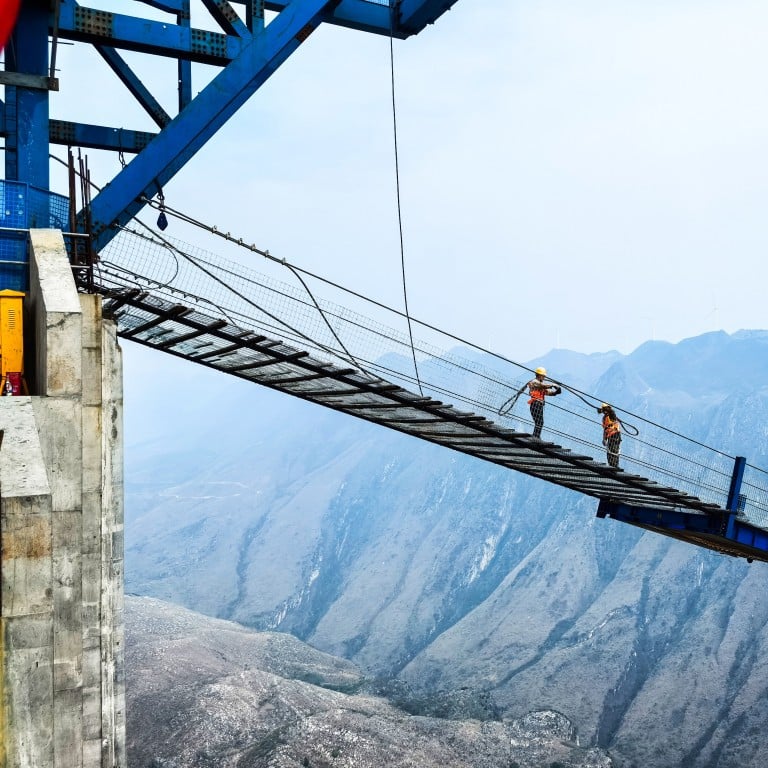
China’s local government debt woes hurting private firms, creating grass-roots distrust: academic
- Wuhan University professor Feng Chuan says local government debt problems have torn apart the fundamental trust system that upholds social governance order
- Local government debt rose by 14.3 per cent year on year to 41.4 trillion yuan (US$5.7 trillion) by the end of February
A two-decade pursuit of vanity projects has left many local authorities in China in a deep morass of debt, with their status as “the largest local defaulters” not only having a knock-on effect on private businesses, but also adding to a grass-roots governance crisis, an academic has warned.
Feng Chuan, an associate professor at Wuhan University’s School of Political Science and Public Administration, called for greater efforts to rebuild social trust and business confidence after finding that officials, residents, local government financing vehicles (LGFVs), contractors and banks had been caught in the debt limbo.
“Credit overdraw systematically occurs … tearing apart the fundamental trust system that upholds social governance order,” he wrote in an article published last month on news portal NetEase.
Businesswoman’s arrest after seeking arrears from government sparks investigation
Local government debt rose by 14.3 per cent year on year to 41.4 trillion yuan (US$5.7 trillion) by the end of February, according to data obtained from the Ministry of Finance and reported by state-run Xinhua News Agency on Tuesday, although the figure does not include so-called hidden debts, including LGFVs.
LGFVs flourished following the 2008 global financial crisis as a way of funding China’s infrastructure building spree, with few generating returns. The debt raised is kept off the balance sheets of local authorities, yet carries an implicit government guarantee of repayment.
Beijing has already made efforts to relieve the pressure by suspending infrastructure projects in some of the most indebted provinces and providing funds through transfer payment channels and special treasury bonds.
However, Feng found that local government debts sowed deep distrust among private entrepreneurs and local residents, with major policy changes required to address the issue, he added.
We can’t afford to fall behind
In one county in China’s southern Guizhou province, Feng found that local land sales – often used as collateral to obtain bank loans – had dropped to 100 million yuan a year, making it difficult to cover the annual interest payment of its 8 billion yuan of debt.
When asked why local governments were obsessed with building squares and fancy buildings, a local official attributed it to pressure to achieve political accomplishments, driven by competition to ensure gross domestic product growth.
“We can’t afford to fall behind,” the unnamed Guizhou county official was quoted as saying in Feng’s article.
“Each county chief focuses on their own achievements during their term and does not consider the long-term consequences.”
Local officials are often seen as motivated to grow the economy to gain promotion, inflating figures while under pressure to meet growth targets.
After years of unchecked infrastructure spending, Guizhou faces a debt reckoning
Some counties “inflated” state-owned assets to secure loans from banks, resulting in a surge in non-performing loans, while LGFVs lacked the necessary assets and cash flow to meet banks’ stringent mortgage review criteria, Feng added.
And despite repeated emphasis on debt control from Beijing, Feng found that many heavily indebted villages continued to apply for government funding for more construction projects.
Many of the projects were launched under the aegis of rural revitalisation, a follow-up strategy after President Xi Jinping declared victory over extreme poverty in 2020.
The central government, though, must be wary of excessive local borrowing to create “model villages” in a campaign-style manner, where authorities promote extraordinary mobilisation of resources under strong political sponsorship to implement policies, Feng said.
He also warned that local authorities have been widely caught up in a “city-building campaign”, where investments far exceeded their fiscal capacity to reach “unrealistic political goals”.

